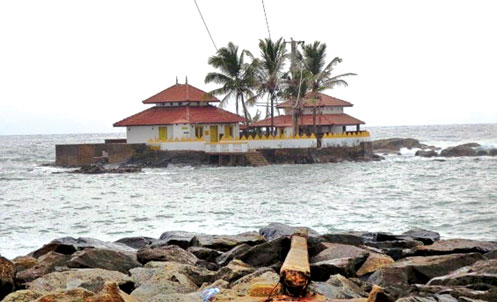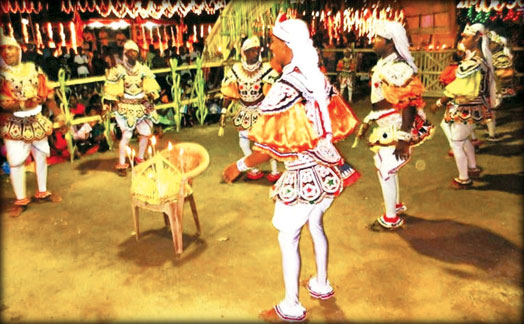God Devol, god of vengeance, benevolence and prosperity
by W.T.J.S. Kaviratne - Ambalangoda Special Cor.
The legendary narratives woven around the arrival of God Devol
against the wishes of Goddess Pattini at the ancient port of Seenigama
on the south coast possess the features of an epic journey depicted in
Greek literature.
 |
|
A view of the Seenigama
Devale |
Before the deportation due to misbehaviour and numerous crimes
committed by him in his homeland and in the voyage reaching his final
destination at the ancient port of Seenigama, God Devol had to undergo a
series of troubles and tribulations.
The folktales connected to god Devol abound in episodes of diversity
full of drama with a tinge of tragedy.
Originally the cult of worshipping God Devol and Goddess Pattini was
confined to the coastal shrine by the beach stretch of Seenigama.
Over the years these deities have been highly venerated as very
powerful and shrines consecrated to both deities had been constructed by
ardent devotees and by now found scattered throughout Sri Lanka.
Research
Anthropological research findings and literature reveal that human
beings are fatalistic by nature and before the emergence of widely
spread major religions of Christianity, Hinduism, Buddhism and Islam.
Worshiping numerous deities proved to be a common practice since the
beginning of human civilisation.
Along with the major world religions still the veneration of numerous
regional gods and goddesses including animals and inanimate objects such
as trees and rocks are continued to be practised throughout the world.
The legendary folktales relevant to Goddess Pattini and God Devol are
intermingled with mythology and legendary folktales and these myths are
everlasting though anonymous. Mythology is not considered just a
collection of stories but it is a universal language using symbols in
conveying a deeper message.
The parentage of Prince Devol had baffled the anthropologists and
historians due to the prevalence of numerous versions of folklore and
the diversity of opinions which had not been properly established.
Mythical king
Prince Devol was believed to be one of the seven sons of a mythical
king known as Sri Raman hailed from the kingdom of Malala in India.
Folklore reveals that he had seven consorts known as Thedapathi,
Gunapathi, Amithapathi, Siripathi, Mihipathi, Yasapathi and Agnipathi.
King Raman's seven consorts had given birth to seven sons known as
Devol, Hiruras, Sandaras , Agniras, Maharas, Kudaras and Samiras.
Prince Devol was also identified as one of the three sons of Queen
Thrivakkali of Solirata .
In addition to the prevailing folklore traditions relevant to the
parentage of Prince Devol, a king known as Swarna Ramasinghe had also
been identified as his father.
Andun Kurumbara, Sandun Kudumbara, Erdi Kudumbara, Mal Kudumbara,
Dala Kudumbara and Vadiga Kudumbara were the six other names given to
Prince Devol.
Myths based on the origin of prehistoric civilisations are full of
exaggerations and proved to be extremely complex and confusing mostly
due to the additions of numerous other regional folk stories. Some
scholars believe that the ancient shrine of Seenigama existed long
before the arrival of Prince Vijaya with his retinue of Aryans in Sri
Lanka.
Opinions of scholars widely differ on the existence of God Devol and
Goddess Pattini and numerous interpretations have been given to the
events that unfolded in the long narration of the legend since the day
of deportation of Prince Devol and his six brothers.
Goddess Pattini was believed to have held sway all over the country
while residing in Seenigama shrine. The era of her reign had coincided
with that of the Lord Buddha's lifetime when the country was inhabited
by prehistoric tribes of Yakka and Naga.
A hymn usually recited during the ritual dances performed in Devol
festival comprised a description of the existence of a shrine
consecrated to Goddess Pattini at the ancient port of Seenigama till the
invasion of the abode by the Prince Devol.
Resembling Greek traditions of epic poems, verse recitation of the
narration of the whole episode of is practised in the annual Devol and
Pattini ritual celebrations held in shrines across Sri Lanka.
The ritual dances are performed lasting for one whole night till the
dawn of the following day by a troupe of experienced shamen (kapuralas).
The verse renditions or hymns recited to the tune of the beating of
several drums are highly rhythmic and easy to understand due to the
colloquial language generally used in composing them.
Prince Devol and his six brothers were in the habit of killing
animals and old people in the kingdom of their father. The citizens made
complaints against the terror unleashed by the seven princes.
To resolve this crisis created by his seven princes, the king got
seven ships specially made to deport them out of his kingdom. They set
sail in the highly decorated magnificent wooden ships full of silk
clothing material.
Some scholars are of the opinion of the existence of a busy trading
port at Seenigama.
Bartering
They claimed that the merchants reached Seenigama port were engaged
in bartering commodities. Sugar was produced in the adjoining villages
and exported from the port and due to this the coastal stretch was known
as Seenigama. Several other anecdotal evidence had been put forward as
connotation for the name Seenigama.
According to legend, it was believed during the era of Kakusanda
Buddha a King known as Swarna Kuduppara Ramasinghe had seven consorts.
The seven sons of the consorts in their previous birth had offered a
robe to Kakusanda Buddha in order to become God Devol.
One of the consorts had given birth to a daughter known as Padmini
had offered a sweet mango to Kakusanda Buddha to become the Goddess
Pattini.
Padmini died and was reborn as Goddess Pattini and took refuge in the
abode of Seenigama shrine.
 |
|
Dancers |
Many years later seven brothers of Padmini (Goddess Pattini) took
part in a trade mission and the mid sea ship- wreck posed great danger
to their lives. The seven princes were drifting for seven days there
Devol Samy prayed to God Sakra about their plight. God Sakra intervened
and rescued them and created a stone rafter to continue their mission.
All the deities reigned in various parts of Sri Lanka reached the
consensus not to allow Prince Devol and his retinue to disembark on any
of the ancient sea ports of Sri Lanka.
Prince Manawamma prevented disembarking at Yapa Patuna(Jaffna),
Kandakumuru prevented their entering Samankula at Panadura, God Upulwan
objected entering at Dondra point, God Dadimunna intervened when Devol
tried to enter the country from Lanumodara, God Deva Rajjuru objected
Prince Devol and his retinue entering from Unawatuna.
In addition to these ancient sea ports. Prince Devol had tried to
reach ashore from Kosgoda, Beruwala and Ambalangoda. Failing all these
attempts of reaching ashore Devol and his six other brothers tried to
disembark at Seenigama where his sister Padmini from a previous birth
was residing at the coastal shrine as Goddess Pattini.
All the deities including Goddess Pattini conspired against the
arrival of Prince Devol at Seenigama. Pattini created seven mounds of
fire on the beach stretch behind the ancient Shrine of Pattni built on a
rocky crop of land now found several metres away in the sea as a result
of massive sea erosion taken place as far back as 1921.
Showing his divine prowess Prince Devol and his six brothers crossed
over the flames and destroyed the seven mounds of fire.
Reminiscing that they were born as brother and sister, they reached
an amicable settlement .
Fire walking in Sri Lanka is believed to have originated at Seenigama
and Prince Devol known as Devolsamy was groomed how to conduct rituals
by his sister Goddess Pattini.
According to folklore believed by the devotees for generations
Goddess Pattini had handed over the throne to his brother God Devol,
ceded her reign in the area and left for Navagamuwa identified by her as
her permanent abode where the ancient shrine consecrated to Goddess
Pattini is located. Some considered Prince Devol (Devolsamy) as a
magician who possessed the ability to do miracles.
Magic powers
Prince Devol after coming to Seenigama was in the habit of exploring
the hinterland and he settled down at a suburban village known as
Weragoda where Devol found his mistress. Nobody in the village Weragoda
was aware neither Devol's magic powers nor his divine connections as he
was a total stranger to the area.
Devolsamy was the name given to him by the villagers and he appeared
to be a vagrant even though he was on disguise. Even though Devolsamy
was unemployed he was in the habit of bringing home rice, fish, sugar,
coconuts and other essential foodstuff.
After a lapse of several years Devolsamy's wife at Weragoda gave
birth to a son who grew up to be a young boy at Weragoda and one day
Devolsamy's wife explained to her son about her suspicions of his
father's behaviour and asked him to follow his father to check how
Devolsamy managed to bring all the food items almost daily. On the
instructions given by his mother,one day son followed his father and
found how his father collecting sand from the beach into a piece of
cloth and shaking coconut trees and plucking nuts. Devolsamy's son
revealed everything to his mother.
The following day Devolsamy went to the beach but the miracles did
not work, the sand did not change as usual into rice or sugar, coconuts
could not be plucked by shaking trees.
Devolsamy suspected his son was responsible for revealing the secret
. He thought that he lost all his divine powers because of his son. He
went home and killed his son.Certain shamen were of the belief Devolsamy
killed both his wife and the son as a way of vengeance.
Some villagers of Weragoda still believe that the local wife of
Devolsamy was from a clan known as Masachchi. The descendants of
Masachchi clan is still found at Weragoda where there is an ancient
shrine consecrated to God Devol.
Later, Devolsamy left for the Kataragama shrine and revealed his
plight to God Kataragama. Devolsamy found it extremely difficult to
survive and became a vagrant again and prayed that God Kataragama help
him find some kind of livelihood and he was assigned a job as a sentry
to Kadawara shrine at the precincts of Kataragama shrine.
Originally people sought the assistance of God Devol whenever they
want to take revenge against their enemies and wrongdoers. Grinding
chilli, pepper and garlic was practised as a ritual on a grinding stone
found in the ancient shrine now found in the sea.
It has also become a trend among politicians to break coconuts
against their political opponents at Seenigama.
The seenigama shrine consecrated to God Devol, on the Galle- Colombo
main road in close proximity to the Hikkaduwa Tourist Resort has become
a sought after shrine by the devotees seeking divine assistance in
resolving numerous problems.
Sterility
When medical treatments was found to be not effective for sterility
and failure of legal procedures for exam success, promotions and winning
elections people of all walks of life seek the assistance of God Devol.
The plethora of information based mostly on mythology and folklore
relevant to the arrival of prince Devol at the ancient port of Seenigama
and his activities at a surburban village of Weragoda could be garnered
from the scholarly treatises compiled by Prof Vinie Vitharana, Prof
Thilak Kariyawasam, Prof Bandusena Gunasekara, Prof M.H.Gunathilaka,
Scholalrly bhikkhus.
Besides Chief Kapuralas (Shamen) having experience of conducting
rituals continuously for several years both at the ancient shrines of
God Devol at Seenigama and Weragoda sing numerous hymns praising God
Devol and narrate of the origin of Devol in verse.
Almost similar rituals are performed annually with thousands of
devotees from various parts of Sri Lanka in every shrine dedicated to
god Devol and goddess Pattini found throughout Sri Lanka. |

